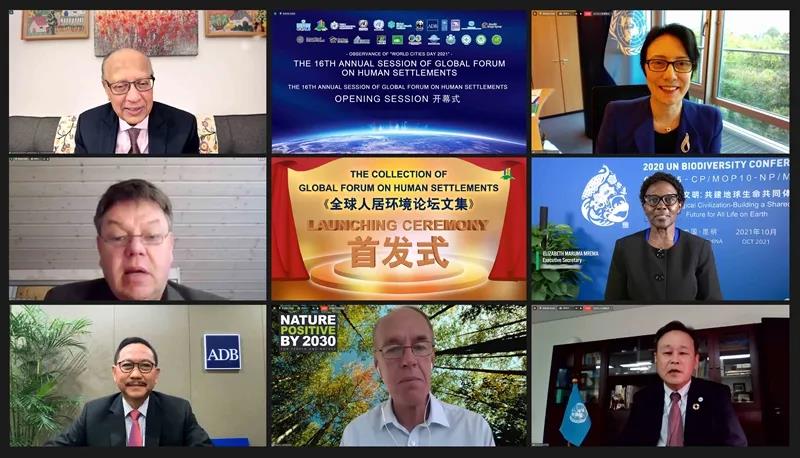Committed to Sustainable Cities and Human Settlements for All
In Special Consultative Status with ECOSOC
While being mired in the unprecedented predicament created by COVID-19, the world is confronted with non-conventional safety challenges brought by climate change, biodiversity loss and environmental pollution. Consequently, the intertwined multiple crises are causing unimaginable calamity and imminent threats to mankind. It is high time that the international community learn from the crisis, promoting a nature-based green recovery and embarking on a green transformation towards inclusive, low-carbon, resilient and sustainable development.
A green transition is sweeping the world. 2021 is the beginning of the Decade on Ecosystem Restoration, a rallying call for the protection and revival of ecosystems around the world. Ecosystems are the cornerstone of a healthy planet and social well-being, and there has never been a more urgent need to restore damaged ecosystems than now.
Meanwhile, the world is entering the era of carbon neutrality. More than 100 countries and many leading cities have committed to achieve net zero emissions by the middle of this century. China, the world’s second largest economy, has pledged to peak greenhouse gas emissions by 2030 and reach net zero by 2060. It is imperative that countries supercharge their effort in fostering innovation, catalyze green changes and spur sustainable development that ensures safety, efficiency, equity, inclusiveness and resilience.
Cities are not only the source of resource consumption, pollution, emission and ecological degradation, but also the main battle field of addressing the above-mentioned challenges, sustaining economic growth and achieving sustainable development. Bearing the brunt of the COVID-19 outbreak, cities will see the five trends - decoupling, decarbonization, decentralization, digitalization and glocalization - manifest distinctly in post-pandemic urban development.
To meet the goals of the “2030 Agenda for Sustainable Development” and the “Paris Agreement”, we must prioritize cities, accelerating green transition, leading high-quality development with innovation, implementing integrated urban planning, and adopting nature-based solutions and climate-friendly design strategies. Essentially, we need to step up investment in urban green infrastructure, to scale up efforts in maintaining ecological balance and integrity, to improve resource and energy efficiency, to strengthen the adaptability and resilience of buildings and communities, to ensure a just transition from fossil fuels to clean energy, to enhance the urban governance capabilities of all stakeholders, and to drive innovation on how cities are planned, invested, developed and managed, thereby making make cities and human settlements healthy, resilient, carbon-neutral and sustainable.
UN Secretary-General Antonio Guterres stressed at the One Planet Summit that “2021 must be the year to reconcile humanity with nature”. “We begin a new year under the sign of hope”. 2021 is a crucial year for implementing the "2030 Agenda for Sustainable Development" and accelerating carbon neutral actions at both local and national level. Against this background, the 16th Annual Session of Global Forum on Human Settlements (GFHS 2021) - one of the most important events focusing on sustainable cities and human settlements - had taken place from October 27 to 29 as an observance of “World Cities Day”, with the theme being “Accelerate Green Transformation and Innovation towards Healthy, Resilient and Carbon-neutral Cities”.
The forum would be organized in a format combining online and offline participation, to address how cities can use green recovery as a golden opportunity to kick-start a green transformation and drive innovation at all levels and across all sectors, thus enhancing urban safety, resilience and inclusiveness, boosting green growth, and achieving coordinated, healthy, and high-quality sustainable urban development.
Dignitaries from numerous countries, senior officials from UN and concerned international organizations, green city mayors, business leaders, and well-known experts and scholars had been giving keynote speeches and joining thematic discussions. Webcasting and simultaneous translation between Chinese and English would be available to foster interactive dialogues with stakeholders across the globe, and it was expected to reach out to approximately a hundred thousand of interested persons.







